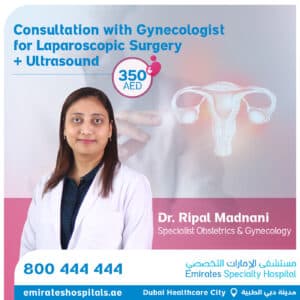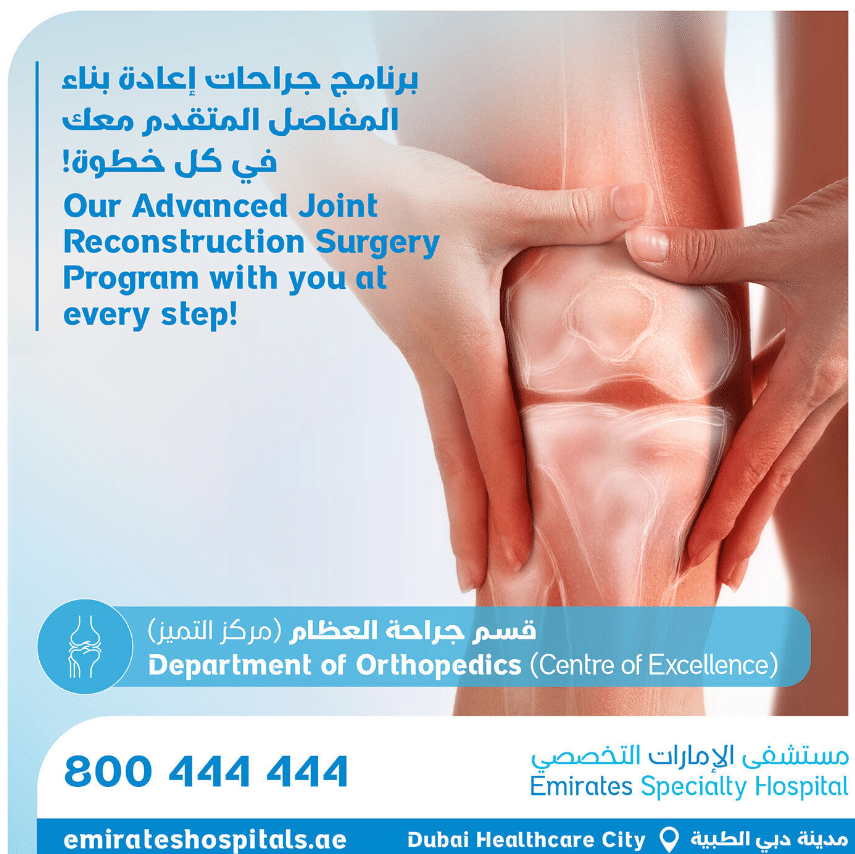Our colorectal surgery department at the Emirates Specialty Hospital deals with issues concerning the colon, rectum, and anus. Our hospital provides the best colorectal surgeon in Dubai.
Doctors can treat problems such as blockages when passing stools, inflammation of the bowel (Crohn’s disease) and lower digestive tract concerns, including bowel cancer. Patients come to us at Emirates Specialty Hospital when experiencing discomfort for haemorrhoids, a term used to describe swollen veins in the lower part of the rectum or anus.
Colorectal Surgery
Fissures (anal cracks or tears), faecal incontinence, rectal prolapse, and birth defects such as anorectal malformations, can also be treated at Emirates Specialty Hospital.
Through laparoscopic (keyhole) surgery, the area can be examined using a small camera, paired with ultrasound, a computerised tomography (CT) scan or magnetic resonance imaging (MRI) scan techniques. It ensures minimal invasion through slight incisions.
Laparoscopic surgery allows a closer look at the problematic areas and can involve the removal of all or part of the affected areas, including where masses and tumours are present.
Some conditions can be conservatively treated through a change in diet or using non-surgical treatments such as banding (cutting off the bloody supply to the affected veins). Where necessary, surgery can shrink haemorrhoids and remove them if itching or discomfort does not clear up after a few days. Haemorrhoids are especially painful, as the lower third of the anal passage contains nerves, even though the upper two-thirds do not. Therefore, if over-the-counter ointments, creams and suppositories, combined with lifestyle changes, cannot relieve symptoms, our patients may be advised to have a haemorrhoidectomy operation.
With a haemorrhoidectomy (complete removal of haemorrhoids), the chances of haemorrhoids returning are only 1 in 20 and, as patients are put under general anaesthetic, the procedure is pain-free but can result in downtime of about one-week post-operation.
Alternatively, in some cases, a haemorrhoidal artery ligation, a procedure which stitches hanging haemorrhoids close to the vessel to block blood supply, can be performed. It has a quicker recovery time compared to a haemorrhoidectomy.
Complications may result in fistulas, which can also be treated by the team at Emirates Specialty Hospital. This is when a collection of pus forms between the end of the bowel and the anus, a channel can be left behind when the liquid drains, causing throbbing pains, fever, and more uncomfortable issues.
Treatments include a fistulotomy (cutting open the fistula to allow it to form a flat scar when it heals), inserting a seton thread for a period of a few weeks, to start the recovery process, and filling it with a plug, glue or covering with tissue.
Patients may also have polypectomy (removal of a polyp), strictureplasty (creating an opening in the bowel for relief), colectomy (restructuring the large intestine) and anoplasty (reconstructing the anus) procedures carried out with us at Emirates Specialty Hospital.
How will you get the best colorectal surgeon in Dubai?
The colorectal surgeon is the branch of medicine that deals with the diagnosis, surgical intervention and follow-up of the diseases in the large intestine, the parts of large intestine close to anus(the rectum) and in the breech area. General surgeons specializing in Colorectal Surgery do the treatment of such diseases.
Diseases that fall into the field of Colorectal Surgery:
- Bowel cancer
- Rectal cancer
- Bowel knotting
- Hemorrhoids
- Chronic constipation
- Stool incontinence
- Gas incontinence
- Ulcerative Colitis
- Breech abscess
- Crohn’s Disease
- Carcinoid Tumors
- Anismus
Colorectal cancers
Colorectal cancers are cancer types that occur in the colon and rectum. Colorectal cancers may not show obvious symptoms at first. Symptoms usually begin to appear in cases where cancer progresses. Colorectal cancers begin as benign formations at first, and may then grow. There is a possibility that this type of cancer, which is usually observed in the colon, then metastasizes and leaps to other organs. Colorectal cancers often metastasize to the lung and liver.
What are the symptoms?
Symptoms of colorectal cancers begin to appear in later stages. In general, the following symptoms are observed:
- Constant abdominal pain
- Blood and rectal bleeding in stool
- Changes in the intestines that last for several days, such as diarrhea, constipation
- Weakness
- Feeling of stool constantly, which does not pass even after stool.
Best Colorectal Surgeon in Dubai
You can have the best colorectal surgeon in Dubai in our hospital. Colorectal surgery applications can be done open or closed. Open surgical applications are disadvantageous in terms of patient comfort and recovery time. Today, very successful applications are made as closed and robotic. The risk of infection is lower in robotic colorectal surgery. Since it is made by opening smaller incisions, it is superior in terms of both healing duration and cosmetically open surgery. In robotic surgery, blood transfusions are less needed and the risk of complications is low. The need for pain relief is less, so patients can return to their normal lives more quickly. In addition, there is no delay in treatment for patients who will receive post-operative chemotherapy and radiotherapy. Therefore, robotic surgery is of great importance in the treatment of colorectal cancer. However, robotic colorectal surgery may not be performed on every patient. How to perform robotic surgery depends on the condition of the patient and the development of the disease.







